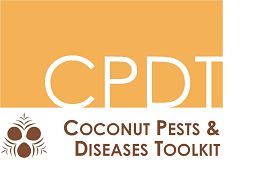Getting help
The CPDT is intended to help you prevent, assess and manage coconut pest and disease problems yourself. However, often you will need outside help. The following people and organisations can provide additional support.
The first point of contact for growers should be local agriculture / environment officers.
- Local primary contacts and regional agencies: the regional CROP agencies are mandated to provide training and assist with managing pest and invasive species in the Pacific. Local primary contacts are able to make formal approaches to the CROP agencies. These agencies include SPC and SPREP.
- Websites, forums, apps and blogs: online forums can put you in contact with a wider range of experts that may be able to help.
- Technical experts: technical experts will be able to provide you with advice on identification, prevention and management of coconut pests and diseases.
Local primary contacts and regional agencies
The regional CROP agencies are mandated to assist with preventing invasions of pests and diseases (biosecurity and incursion response) and managing invasive species in the Pacific.
The most important of these agencies for invasive species / pest management and biosecurity are SPC and SPREP. There are formal ways to contact SPREP and SPC and your first point of contact is your local Agriculture / Quarantine or Environment office.
Members of the Pacific Community
Note the absence of links only indicates that the country does not have a web presence for environment / biosecurity / agriculture.
|
Australia
American Samoa
-
Cook Islands
Federated States of Micronesia
-
Fiji
French Polynesia
Guam
Kiribati
Marshall Islands
-
Nauru
-
New Caledonia
Biosecurity New Caledonia. Information on products authorized for import without permit or certificate.
New Zealand
Niue
|
Northern Mariana Islands
Palau
Papua New Guinea
Pitcairn Islands
-
Samoa
Solomon Islands
-
Tokelau
Tonga
Tuvalu
-
United States of America
Vanuatu
Wallis & Futuna
-
|
Websites, forums, apps and blogs
PestNet, ALIENS-L and other resources can put you in touch directly with a range of experts that can provide advice on everything from identifications to management of pests and invasive species. Anyone can use these services.
ALIENS-L
ALIENS-L is the mailing list of the Invasive Species Specialist Group (ISSG) of the IUCN Species Survival Commission. The ISSG aims to "reduce the threats posed by invasive species to natural ecosystems and their native species, through increasing awareness of invasive species and means of controlling or eradicating them". ALIENS-L allows users to freely seek and share information on invasive species and the threats which they pose to the biodiversity of our planet. Subscribe to the list to ask questions. Historical discussions are not kept on ALIENS-L.
The difference between ALIENS-L and PestNet, is that PestNet is primarily focused on crop pests and diseases and ALIENS-L is primarily focused on invasive species (that might affect crops also). But the two complement each other well and many people working on pests and invasive species belong to both groups.
COGENT
COGENT's goal is to improve coconut production on a sustainable basis and to increase incomes in developing countries through improved cultivation of the coconut and efficient utilization of its products.
Pacific Pests and Pathogens app
The Pacific Pests and Pathogens app for mobile devices can help you identify hundreds pests and diseases.
PestNet
PestNet is an email network that helps people worldwide obtain rapid advice and information on crop protection. Topics include pest identifications from digital images, pest outbreak alerts, pest management (biological, cultural, and chemical), and quarantine interceptions. Subscribe to PestNet to ask questions.
PestNet also has a comprehensive range of resources for managing pests. You can browse PestNet for factsheets and other information.
Plant Village
Plant Village has a Q&A forum where you can ask questions regarding coconut pests and diseases.
Replantcoconuts blog
Roland Bourdeix's blog on coconut replanting provides advice on varieties, where they can be found, and best-practice planting design, including the Polymotu concept.
WhatsApp groups
SPC has a WhatsApp group (Fiji Plant Health Doctors), that you can join to get answers to your questions. Contact the SPC Land Resources Division Help Desk to join up.
Technical experts
Grahame Jackson. Chair and moderator of PestNet. Grahame has worked with national programs, regional and international organisations in the Pacific and Asia, and has special interests in plant pathogens, tissue culture, tropical root crops and plant genetic resources. Currently in Sydney, Australia.
Sean Marshall. Sean works on pest and disease programs, including a major focus on biological and other controls of Coconut rhinoceros beetle for AgResearch in New Zealand.
Roland Bourdeix. CIRAD. Roland has worked for many years in many developing countries in the Pacific, Africa, South America and elsewhere. Roland is a specialist in the culture and diversity of coconut.
Bob Macfarlane. Bob is a retired entomologist with 40+ years experience in plant protection and biosecurity with national governments, regional programs and research institutions in the Pacific and Asian regions. He now lives in Gizo, Western Solomon Islands.
Richard Davis. Richard is a plant pathologist with the Australian Government’s Department of Agriculture and Water Resources, based in Far North Queensland. He has experience working on a range of different plant pathogens causing diseases of crops of importance in the Pacific Islands, including coconuts.
